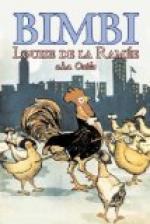August nodded his head, then burst into a passion of tears.
“Well, for sure he is a fool,” said the neighbor. “Heaven forgive me for calling him so before his own child! but the stove was worth a mint of money. I do remember in my young days, in old Anton’s time (that was your great-grand-father, my lad), a stranger from Vienna saw it, and said that it was worth its weight in gold.”
August’s sobs went on their broken, impetuous course.
“I loved it! I loved it!” he moaned. “I do not care what its value was. I loved it! I loved it!”
“You little simpleton!” said the old man, kindly. “But you are wiser than your father, when all’s said. If sell it he must, he should have taken it to good Herr Steiner over at Spritz, who would have given him honest value. But no doubt they took him over his beer—ay, ay! but if I were you I would do better than cry. I would go after it.”
August raised his head, the tears raining down his cheeks.
“Go after it when you are bigger,” said the neighbor, with a good-natured wish to cheer him up a little. “The world is a small thing after all: I was a traveling clockmaker once upon a time, and I know that your stove will be safe enough whoever gets it; anything that can be sold for a round sum is always wrapped up in cotton wool by everybody. Ay, ay, don’t cry so much; you will see your stove again some day.”
Then the old man hobbled away to draw his brazen pail full of water at the well.
August remained leaning against the wall; his head was buzzing, and his heart fluttering with the new idea which had presented itself to his mind. “Go after it,” had said the old man. He thought, “Why not go with it?” He loved it better than any one, even better than Dorothea; and he shrank from the thought of meeting his father again, his father who had sold Hirschvogel.
He was by this time in that state of exaltation in which the impossible looks quite natural and commonplace. His tears were still wet on his pale cheeks, but they had ceased to fall. He ran out of the courtyard by a little gate, and across to the huge Gothic porch of the church. From there he could watch unseen his father’s house door, at which were always hanging some blue-and-gray pitchers, such as are common and so picturesque in Austria, for a part of the house was let to a man who dealt in pottery.
He hid himself in the grand portico, which he had so often passed through to go to mass or complin within, and presently his heart gave a great leap, for he saw the straw-enwrapped stove brought out and laid with infinite care on the bullock dray. Two of the Bavarian men mounted beside it, and the sleigh-wagon slowly crept over the snow of the place—snow crisp and hard as stone. The noble old minister looked its grandest and most solemn, with its dark gray stone and its vast archways, and its porch that was itself as big as many a church, and its strange gargoyles and lamp-irons black against the snow on its roof and on the pavement; but for once August had no eyes for it: he only watched for his old friend. Then he, a little unnoticeable figure enough, like a score of other boys in Hall, crept, unseen by any of his brothers or sisters, out of the porch and over the shelving uneven square, and followed in the wake of the dray.




